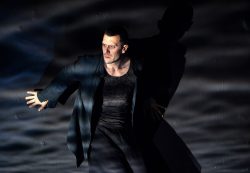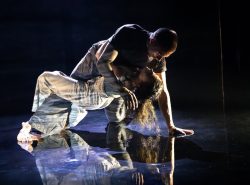 THE Greek myths? A lot of old nonsense. Ancient colourful legends, full of violent, sex-obsessed gods, vengeful goddesses, weird monsters and helpless, mainly human, victims of the deities’ lust or greed? Well, that’s the common image. And it’s not wrong – the gods, after all, are really only super-humans, in the sense of being the archetypes of human characteristics (rather than Spiderman or Batman).
THE Greek myths? A lot of old nonsense. Ancient colourful legends, full of violent, sex-obsessed gods, vengeful goddesses, weird monsters and helpless, mainly human, victims of the deities’ lust or greed? Well, that’s the common image. And it’s not wrong – the gods, after all, are really only super-humans, in the sense of being the archetypes of human characteristics (rather than Spiderman or Batman).
Listen to any news broadcast, read any media interview … there they are, the tyrants and the murderers, the super-egos and the narcissists …
Narcissists! Think Trump, Henry VIII, Napoleon, Hitler, a roll-call of the ruthless, power-mad and self-obsessed. We all know someone who has been described as a narcissist. But these days the word is bandied about with no real understanding of what psychiatrists actually mean when they use it – let alone where the word comes from.
Like so much of our medical and psychological terminology it comes from the Greek – and it has its roots in the myth of a beautiful boy who fell in love with his own reflection … and drowned in the pool where he gazed at it. The ancient Greeks were as self-obsessed as the next person – they could probably teach our selfie-addicted, me-me-me culture a thing or two.
Echo and Narcissus, choreographed by Kim Brandstrup, is at the latest commission by Deborah Warner , now nearing the end of her time as guest artistic director of Bath Theatre Royal’s Ustinov Studio. It is the final part of a series inspired by Greek myths as retold by the Roman poet Ovid in his Metamorphoses. The previous works were Minotaur and Metamorphosis (Cupid and Psyche). Brandstrup is planning to make these three powerful short dance works into a full-length trilogy.
 The wordless plot begins with the blind prophet Tiresias (danced by the charismatic Jonathan Goddard – you literally believe he is blind) who has warned that Narcissus will have a long life as long as “he does not know himself.” Young men and women are attracted to the handsome young man, and the nymph Echo (a convincing and poignant Laurel Dalley-Smith) loves him passionately – but he ignores them all, refusing to allow anyone to touch him. In Brandstrup’s subtle re-working, Narcissus (the astonishing Seirian Griffiths) has a double (danced by Archie White), reinforcing the drama and confusion of Narcissus’s emotional journey. At the very end, Echo manages to touch him and draw him out of his self-absorption … to what future?
The wordless plot begins with the blind prophet Tiresias (danced by the charismatic Jonathan Goddard – you literally believe he is blind) who has warned that Narcissus will have a long life as long as “he does not know himself.” Young men and women are attracted to the handsome young man, and the nymph Echo (a convincing and poignant Laurel Dalley-Smith) loves him passionately – but he ignores them all, refusing to allow anyone to touch him. In Brandstrup’s subtle re-working, Narcissus (the astonishing Seirian Griffiths) has a double (danced by Archie White), reinforcing the drama and confusion of Narcissus’s emotional journey. At the very end, Echo manages to touch him and draw him out of his self-absorption … to what future?
The dancing and acting are utterly compelling, and the movement is acrobatic and mesmerising. Sometimes Griffiths appears to fly through the air. Goddard moves with the silent weight of age and wisdom. The brilliantly designed lighting by Chris Wilkinson constantly challenges and moves our emotions around, following the dancers and trying to make sense of their journey. The complex soundscape, that varies from plangent strings to harsh electronic, is designed by Eilon Morris.
The evening starts with a short film of Leda and the Swan – the beautiful nymph Leda who is seduced by Jupiter/Zeus in the guise of a swan – danced by the charismatic Tommy Franzen and Zenaida Yanowsky. This haunting and erotic piece by Kim Brandstrup was filmed about ten years ago, and is performed with music by Nico Muhly and includes poetry by WB Yeats.
This is followed by Six Metamorphoses After Ovid by Benjamin Britten, performed by the virtuoso oboeist Judith Proctor. The six short pieces are Pan, Phaeton (who drove the chariot of the sun and was hurled into a river by a thunderbolt), Niobe (who was turned into a mountain as she mourned for her 14 dead children), Bacchus (of the famous wild feasts), Narcissus and Arethusa (who fled from a river god and was turned into a fountain).
Metamorphosis is a fascinating concept – its relevance and resonance are powerful at a time when identity, gender and shifting ideas of selfhood are so prominent in international culture and discussion.
There could hardly be a more timely work than this trio of thought-provoking and disconcerting pieces. Change and uncertainty are all around us, whether it is the national shake-up of an election, the international horrors of the wars in Gaza and Ukraine, personal and social confusion and mental health struggles, or the over-arching challenge of climate change. There used to be a saying, “The Greeks have a word for it.” They do, and it’s not just words.
FC
Photographs by Foteini Christofilopoulou